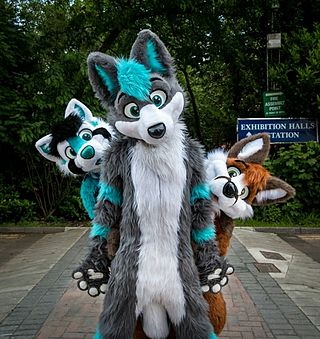
A paraphilia is an experience of recurring or intense sexual arousal to atypical objects, places, situations, fantasies, behaviors, or individuals. It has also been defined as a sexual interest in anything other than a legally consenting human partner. Paraphilias are contrasted with normophilic ("normal") sexual interests, although the definition of what makes a sexual interest normal or atypical remains controversial.

Urolagnia is a paraphilia in which sexual excitement is associated with the sight or thought of urine or urination. The term has origins in the Greek language. Golden shower is slang for the practice of urinating on another person for sexual pleasure, while watersports is the more inclusive term.

The furry fandom is a subculture interested in anthropomorphic animal characters. Some examples of anthropomorphic attributes include exhibiting human intelligence and facial expressions, speaking, walking on two legs, and wearing clothes. The term "furry fandom" is also used to refer to the community of people who gather on the Internet and at furry conventions.

Sexual fetishism or erotic fetishism is a sexual fixation on a nonliving object or body part. The object of interest is called the fetish; the person who has a fetish for that object is a fetishist. A sexual fetish may be regarded as a mental disorder if it causes significant psychosocial distress for the person or has detrimental effects on important areas of their life. Sexual arousal from a particular body part can be further classified as partialism.

A stuffed toy is a toy doll with an outer fabric sewn from a textile and stuffed with flexible material. They are known by many names, such as plush toys, plushies, lovies, stuffed animals, diane, and stuffies; in Britain and Australia, they may also be called soft toys or cuddly toys. The stuffed toy originated from the Steiff company of Germany in the late 19th century and gained popularity following the creation of the teddy bear in the United States in 1903. At the same time, German toy inventor Richard Steiff designed a similar bear. In 1903, Peter Rabbit was the first fictional character to be made into a patented stuffed toy. In 1921, Christopher Robin's stuffed toy, given to him by his father, A. A. Milne, would inspire the creation of Winnie-the-Pooh. In the 1970s, London-based Hamleys, the world's oldest toy store, bought the rights to Paddington Bear stuffed toys. In the 1990s, Ty Warner created Beanie Babies, a series of animals stuffed with plastic pellets that were popular as collector's items.

Fursuits are custom-made anthropomorphic animal costumes owned and worn by cosplayers and members of the furry fandom, commonly known as "furries"; a furry who wears a fursuit is called a fursuiter. The term is believed to have been coined in 1993 by Robert King. Unlike mascot suits, which are usually affiliated with a team or organization, fursuits represent an original character created by their wearer, and are often better-fitting and more intricately crafted, with features such as a moving jaw. Fursuits are made in a wide range of styles, from cartoonish to highly realistic.

Vorarephilia is a paraphilia characterized by the erotic desire to be consumed by, or to personally consume, another person or creature, or an erotic attraction to the process of eating in general practice. Soft vore fantasies are separated from sexual fantasies of cannibalism, also referred to as "hard vore", because the soft vore victim is normally swallowed alive and whole. The word vorarephilia is derived from the Latin vorare, and Ancient Greek φιλία.
Biastophilia and its Latin-derived synonym raptophilia, also paraphilic rape, is a paraphilia in which sexual arousal is dependent on, or is responsive to, the act of assaulting an unconsenting person, especially a stranger. Some dictionaries consider the terms synonymous, while others distinguish raptophilia as the paraphilia in which sexual arousal is responsive to actually raping the victim.

Cartoon pornography is the portrayal of illustrated or animated fictional cartoon characters in erotic or sexual situations. Animated cartoon pornography, or erotic animation, is a subset of the larger field of adult animation, not all of which is sexually explicit.
In human sexuality, kinkiness is the use of sexual practices, concepts or fantasies that are not conventional. The term derives from the idea of a "bend" in one's sexual behaviour, to contrast such behaviour with "straight" or "vanilla" sexual mores and proclivities. It is thus a colloquial term for non-normative sexual behaviour. The term "kink" has been claimed by some who practice sexual fetishism as a term or synonym for their practices, indicating a range of sexual and sexualistic practices from playful to sexual objectification and certain paraphilias. In the 21st century the term "kink", along with expressions like BDSM, leather and fetish, has become more commonly used than the term paraphilia. Some universities also feature student organizations focused on kinks, within the context of wider LGBTQ concerns.
Paraphilic infantilism, also known as adult baby, is a form of ageplay that involves role-playing a regression to an infant-like state. Like other forms of adult play, depending on the context and desires of the people involved paraphilic infantilism may be expressed as a non-sexual fetish, kink, or simply as a comforting platonic activity. People who practice adult baby play are often colloquially referred to as "adult babies", or "ABs".

A furry convention is a formal gathering of members of the furry fandom – people who are interested in the concept of fictional non-human animal characters with human characteristics. These conventions provide a place for fans to meet, exchange ideas, transact business and engage in entertainment and recreation centered on this concept. Originating in California during the mid-1980s, as of 2016 there are over 50 furry conventions worldwide each year.
"Fur and Loathing" is the fifth episode of the fourth season of the American crime drama television series CSI: Crime Scene Investigation, and the 74th episode overall. Written by Jerry Stahl and directed by Richard J. Lewis, the episode first aired on CBS on October 30, 2003. The episode was influential in introducing many outsiders to the furry fandom and presented harmful stereotypes about the community.
Courtship disorder is a theoretical construct in sexology developed by Kurt Freund in which a certain set of paraphilias are seen as specific instances of anomalous courtship instincts in humans. The specific paraphilias are biastophilia, exhibitionism, frotteurism, telephone scatologia, and voyeurism. According to the courtship disorder hypothesis, there is a species-typical courtship process in humans consisting of four phases, and anomalies in different phases result in one of these paraphilic sexual interests. According to the theory, instead of being independent paraphilias, these sexual interests are individual symptoms of a single underlying disorder.
Diaper fetishism, or nappy fetishism, is a type of garment fetish in which a person derives pleasure from themselves or partners wearing or using a diaper. Diaper fetishism can be performed on its own or incorporated into other various kinks. These kinks may include paraphilic infantilism, omorashi, and BDSM. When combined with paraphilic infantilism, the fetish is often called adult baby/diaper lover or AB/DL for short.
Erotic target location error (ETLE) is a hypothesized dimension for paraphilias, defined by having a sexual preference or strong sexual interest in features that are somewhere other than on one's sexual partners. When one's sexual arousal is based on imagining oneself in another physical form the erotic target is said to be one's self, or erotic target identity inversion (ETII).

A fursona is a personally claimed persona resembling an anthropomorphic animal adopted by a member of the furry fandom. Fursonas can provide numerous roles for the creator. According to The New Science of Narcissism, 95% of those in the furry fandom have at least one fursona; with the Anthropomorphic Research Project estimating that the average furry has between two and three fursonas over the course of their life.

Clop is erotic or pornographic fan art, fan fiction, fan films, fan games, and other fan labor based on My Little Pony: Friendship Is Magic, My Little Pony: Equestria Girls, and further generations of the My Little Pony franchise.

Yiff is a slang term used in the furry fandom to refer to pornographic content of anthropomorphic animal characters. It is considered a tongue-in-cheek term in the furry fandom. The term is also used as a way to insult members of the furry fandom, such as in the phrase "yiff in hell". Additionally, the term is also used in the plushie fetish community.










